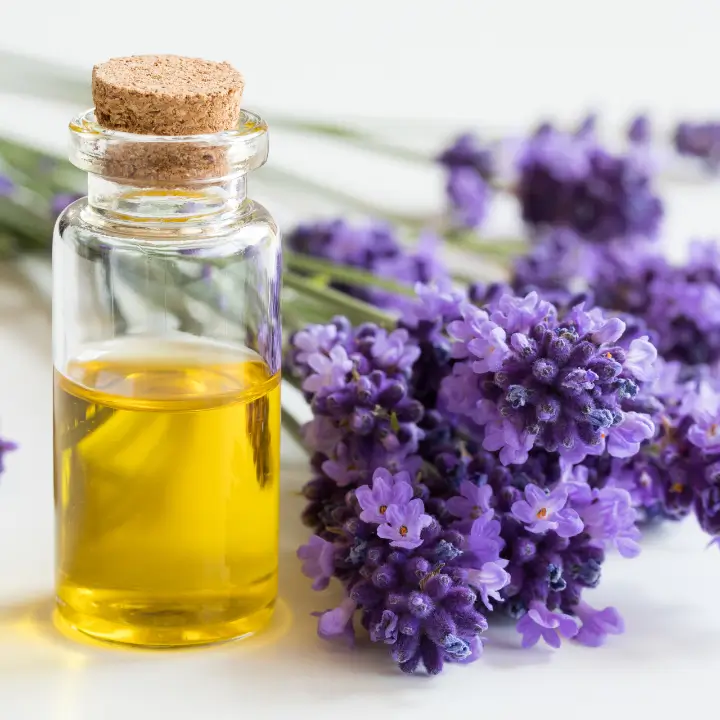Lavender Oil
Lavender oil is a popular essential oil derived from the flowers of the lavender plant, scientifically known as Lavandula Angustifolia. With its enchanting floral scent and versatile properties, lavender oil has been cherished for centuries for its various uses in aromatherapy, skincare, and beyond.
100%
Chemical Free
The captivating aroma of lavender oil has made it a staple in the fragrance industry, where it is used in perfumes, soaps, and candles. Its soothing and calming scent is often associated with relaxation and stress relief, making it a cherished choice for creating tranquil atmospheres.
Beyond its pleasant fragrance, lavender oil is renowned for its potential health benefits. It is widely used in aromatherapy to promote relaxation, alleviate anxiety, and improve sleep quality. Its calming properties also make it beneficial in reducing feelings of restlessness and promoting a sense of well-being.

Product Specifications
| Specification | Details |
|---|---|
| Botanical Name | Lavandula angustifolia / Lavandula officinalis |
| Materials Used | Leaves and Flowers/Buds |
| Color & Odour | Colorless to yellow liquid@ charecteristic odor - Lavender odour |
| Methods of Extraction | Steam Distillation |
| Constituents | Linalool, Linalyl acetate, Ocimene |
| Specific Gravity | 0.920 - 0.980 @ 25°C |
| Acid Index | Not more than 1 mg KOH/g oil |
Specification Details
Optical Rotation
-3º to -10º @ 20°C
Flash Point
182.00°F (83.33°C) TCC
Boiling Point
204.00°C @ 760 mm Hg
Refractive Index
1.459–1.470 @ 20°C
Density
0.875–0.888 g/mL @ 25°C
Shelf Life
2 Years
The Health Benefits of Lavender Oil
It’s important to note that while lavender oil is generally considered safe for most people, some individuals may have sensitivities or allergies.
It’s recommended to perform a patch test before using it topically and to consult with a healthcare professional, especially if you have any underlying medical conditions or are taking medications.
In addition to its therapeutic uses, lavender oil can be enjoyed in culinary applications. It is occasionally used to add a delicate floral flavour to baked goods, beverages, and even savory dishes.
Relaxation and Stress Reduction
Lavender oil is widely recognised for its calming and relaxing effects. Inhaling its aroma or using it in aromatherapy can help reduce stress, anxiety and promote a sense of calmness.
Mood Enhancement
The scent of lavender oil has been shown to have mood-enhancing properties. It may help alleviate symptoms of depression and promote a more positive and balanced emotional state.
Pain Relief
Topical application of lavender oil, when properly diluted, can provide relief from minor pains and aches. It has analgesic properties that may help soothe muscle soreness, headaches, and joint discomfort.
Skin Care
Lavender oil is beneficial for the skin due to its antibacterial and anti-inflammatory properties. It can be used topically to soothe various skin conditions such as acne, eczema, psoriasis, and minor burns.

How to Use Lavender Oil?
- Sleep Aid: Prior to sleep, apply a diluted mixture of lavender oil and carrier oil to your wrists, temples, or the soles of your feet. The soothing scent can help promote a restful night’s sleep.
- DIY Skincare: Incorporate lavender oil into your skincare routine by adding a few drops to your moisturizer, serum, or face mask. This can help soothe and nourish the skin while enjoying the calming properties of lavender oil.
- Topical Application: Lavender oil can be applied topically to the skin after diluting it with carrier oil. This method is suitable for targeting specific areas of the body, such as temples for headache relief or applying to minor skin irritations. Remember to perform a patch test on a small area of skin before applying it more extensively.
- Bath: Add a few drops of lavender oil to your bathwater for a luxurious and calming bath experience. The warm water will help release the aroma, creating a soothing atmosphere and promoting relaxation.
- Inhalation: For immediate relief from stress or headaches, put a drop or two of lavender oil onto a tissue or cotton ball and inhale deeply. This method is convenient and can be done on the go.

Precautions And Considerations
- Perform a patch test before using lemongrass oil topically to check for any potential skin sensitivities.
- Consult a healthcare professional before using lemongrass oil during pregnancy or if you have any underlying medical conditions.
- Always dilute lemongrass oil with a carrier oil before applying it to the skin to prevent irritation.
- Store lemongrass oil in a cool, dark place to preserve its potency and extend its shelf life.
